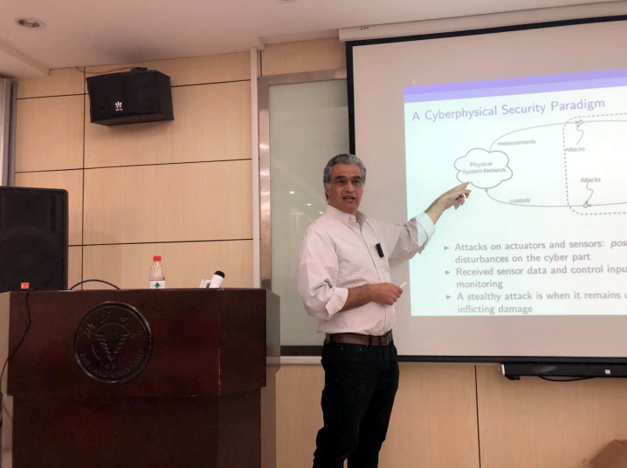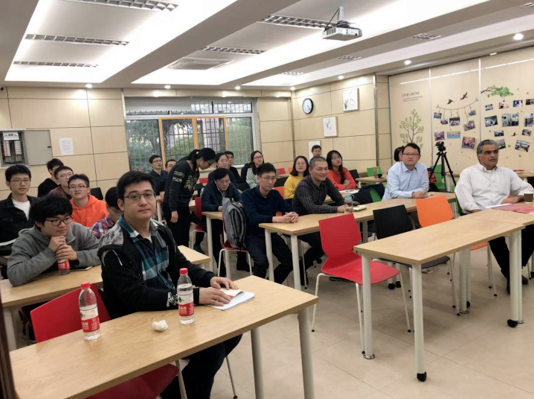Professor Petros G. Voulgaris from the University of Illinois at Urbana-Champaign visited the College of Control Science & Engineering, Zhejiang University recently. On October 26, 2018 during his visit, he delivered a talk for CSE Sci-Tech Innovation Lecture Series on Sampled Data Control and Security in Cyber-Physical Systems.

Cyber-physical systems (CPS) have become ubiquitous in engineering and have extended the range of aerospace applications to several new domains. Aerial robots are typical examples of CPS that can execute cooperative missions of increasing complexity without constant supervision of human operators e.g., forest fire detection, police surveillance, and recovery operations to name a few. Similarly, current and future space applications such as satellite swarms and distributed spacecraft systems, autonomous and aerospace robotic systems, depend critically on the synergy of cyberspace with the physical components.
Pertinent to CPS is the notion of security, which is of paramount importance in aerospace, power, transportation, manufacturing, etc. The concept of security to malicious attacks brings an important new dimension in the design CPS. In this talk, Prof. Voulgaris presented some aspects of this problem related to control system security to attacks and provide some ways to enhance detection and awareness. More specifically, he elaborated on this issue from the control analysis, design and actual implementation point of view. Malicious attacks were considered on actuators and sensors of a feedback system which can be modelled as additive, possibly unbounded, disturbances at the digital (cyber) part of the feedback loop. It is shown that the standard sampled data implementation can create additional vulnerabilities to stealthy attacks, and therefore, when security is at stake, it is of paramount importance to have methods to eliminate these vulnerabilities. By devising a multi-rate scheme, it turns out that stealthy attacks are not possible. Further, precise trade-offs can be provided on performance and safety cost. Last but not least, he touched upon other type of attacks and their connections to switching systems and linear programming.

Professor Petros G. Voulgaris received the Diploma in Mechanical Engineering from the National Technical University, Athens, Greece, in 1986, and the S.M. and Ph.D. degrees in Aeronautics and Astronautics from the Massachusetts Institute of Technology in 1988 and 1991, respectively. Since 1991, he has been with the Department of Aerospace Engineering, University of Illinois where he is currently a Professor (also appointments with the Coordinated Science Laboratory, and the department of Electrical and Computer Engineering.) His research interests include optimal, robust and distributed control and estimation; networked control; applications of advanced control methods to engineering practice including, power systems, air-vehicle, nano-scale, robotic, and structural control systems. Dr. Voulgaris is a recipient of several awards including the NSF Research Initiation Award, the ONR Young Investigator Award and the UIUC Xerox Award for research. He has also been a Visiting ADGAS Chair Professor, Mechanical Engineering, Petroleum Institute, Abu Dhabi, UAE (2008-10). His research has been supported by several agencies including NSF, ONR, AFOSR, NASA, and Boeing totalling more than $12 million of funded projects. He is also a Fellow of IEEE.